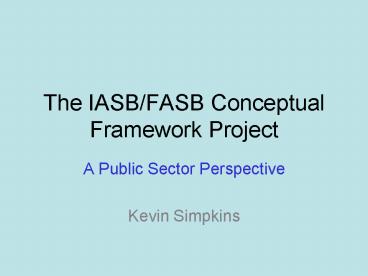The IASB/FASB Conceptual Framework Project - PowerPoint PPT Presentation
1 / 15
Title:
The IASB/FASB Conceptual Framework Project
Description:
The IASB/FASB Conceptual Framework Project A Public Sector Perspective Kevin Simpkins Outline Concepts Why they matter Overview of the Project Progress to Date ... – PowerPoint PPT presentation
Number of Views:168
Avg rating:3.0/5.0
Title: The IASB/FASB Conceptual Framework Project
1
The IASB/FASB Conceptual Framework Project
- A Public Sector Perspective
- Kevin Simpkins
2
Outline
- Concepts Why they matter
- Overview of the Project
- Progress to Date
- Some Public Sector Issues
- Concluding Thoughts
3
Concepts Why they Matter (generally)
- The Basis for Accounting Standards Development
- A Key Element in Principles-based Standard
setting - An antidote to vested interests (or just
preconceived conclusions!) - To enhance efficiency in standard-setting
4
Concepts Why this project matters
- Key to IASB/FASB Convergence
- New concepts will have significant influence
internationally - IPSASBs implicit framework is that of the IASB
- IASB/FASB work will be a key reference source for
the IPSASB - (Note that IPSASB is considering its strategy
for a Conceptual Framework at its meeting this
month)
5
Overview of the IASB/FASB Project - Objective
- to develop a common conceptual framework that
is both complete and internally consistent - a sound foundation for developing future
accounting standards
6
Overview of the IASB/FASB Project - Process
- Building on the Existing Frameworks
- Concentrating on environmental changes and
omissions from existing frameworks - Prioritising cross-cutting issues that affect a
number of projects - Initially considering private sector business
entities only
7
Overview of the IASB/FASB Project The Phases
- Phase A Topic
- A Objectives and qualitative characteristics
- B Elements, recognition and measurement
attributes - C Initial and subsequent measurement
- D Reporting entity
- E Presentation and disclosure, including
financial reporting boundaries - F Framework purpose and status in GAAP
hierarchy - G Applicability to the not-for-profit sector
- H Entire framework
8
The IASB/FASB Project Progress to Date
- Phase A Objectives and Qualitative
Characteristics - Exposure draft due in near future
- Phase B Elements, recognition etc.
- Early work done on asset and liability
definitions - Phase D Reporting Entity
- Planning and Preliminary Analysis done
9
The IASB/FASB Project Some Public Sector Issues
- Timing of Consideration of Not-for-Profits
- Creates risk NFP context will not be well
considered - Is delivering some concepts that are not broadly
applicable - Inefficient as a standard-setting approach
- A challenge for neutrality both transactions
and sectors
10
The IASB/FASB Project Some Public Sector Issues
(cont)
- Stewardship/Accountability is not a Separate
Objective of Financial Reporting - The objective is to assist investors and others
in making investment, credit and similar
decisions - Too narrow for the public sector accountability
is at least a separate objective - A risk the pervasive impact of an incomplete
objective because all things are related - An aside Whither prospective information?
11
The IASB/FASB Project Some Public Sector Issues
(cont)
- Too narrow a Primary User Group
- Primary User Group is present and potential
investors and creditors - In the public sector legislation and funders are
key users who cannot be excluded - No recognition of Compliance
12
The IASB/FASB Project Some Public Sector Issues
(cont)
- Pervasive Focus is on Assessing Cash Flow
Prospects - Cash Flows are relevant to the public sector but
not always - Service performance is a more important focus for
the public sector environment - The focus extends deeply such as into the asset
definition area
13
The IASB/FASB Project Some Public Sector Issues
(cont)
- Changes to the Qualitative Characteristics
- A process approach new for all
- But does not encourage consideration of
differences between entities - Relevance relates to economic decisions of
users - Materiality is also related to economic
decisions of users
14
The IASB/FASB Project Some Public Sector Issues
(cont)
- Asset Definition too Narrow
- Economic Benefits again!
- Benefits to the entity
- The notion of stand ready assets (and
liabilities) is new and needs careful
consideration - No help with the tough issues social policy
obligations especially
15
Concluding Thoughts
- This project is important as are the others being
worked on internationally - The potential impacts are significant and likely
to be enduring - The public sector needs to monitor the work of
both IASB and IPSASB and your own national bodies
and comment































